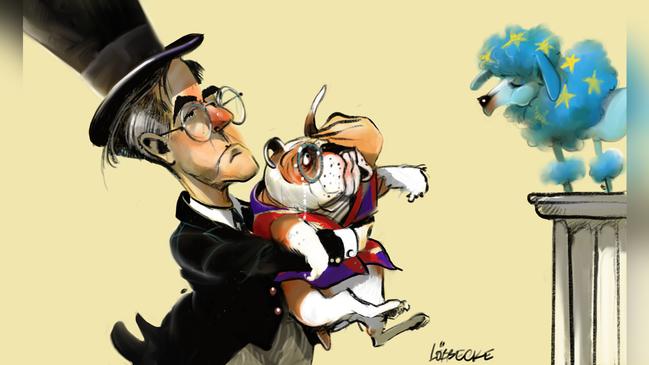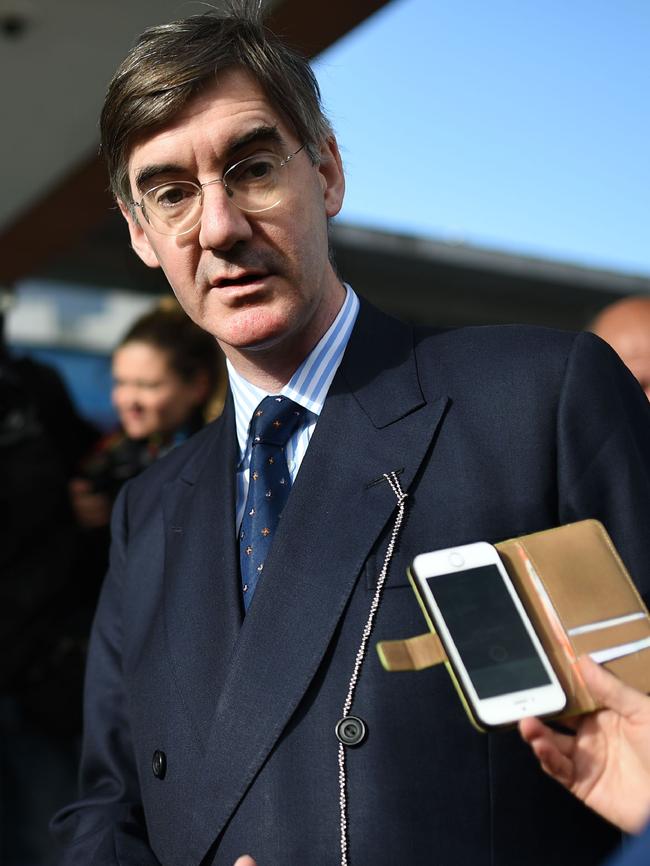
In a political age in Europe that is allegedly swinging to the left, there is surely no more unlikely popular political media star than Jacob Rees-Mogg, the British Conservative MP for North East Somerset. His critics detest him. Some left-wingers claim, absurdly, that he is a fascist. Others more jocularly dub him the Member for the 18th Century.
He is a trenchant Eurosceptic, a devout Catholic with six children, impeccable self-possession, a very big fortune earned in the finance industry, and unflappable good humour, good manners and good cheer, even when under the most relentless and at times, on university campuses, violent attack. As a result of all this, he is immensely popular with a good chunk of the British electorate.
He likes PG Wodehouse and cricket, he dresses formally, he quotes the classics, he opposes abortion as a breach of human rights. Now here is a remarkable thing. The three big characters of British politics are Boris Johnson, Jeremy Corbyn and Rees-Mogg. They are staggeringly different and I don’t equate them in substance, but each is unmistakably himself, personally identified with a more or less coherent world view, and not cut from any conventional political cloth.
This week I met Rees-Mogg for a long discussion in a small tea room in the House of Commons at Westminster. The first impression, apart from his obvious good humour and charm, is he is deadly serious about his political aims. He takes himself lightly, he takes the issues he cares about very seriously. Elected to parliament in 2010, he is the chairman of the European Research Group, which commands about 60 Conservative MPs.

He is fiercely opposed to attempts to water down Brexit, especially by those who argue Britain should try to stay in the European customs union: “The customs union also effectively means the single market.” This is because, as he explains, if goods are free to trade within the EU they must comply with EU regulations. If all your goods comply with all EU regulations, in effect you are living within the regime of the single market.
Rees-Mogg cites the example of Turkey, which lives within a customs union with the EU. Because it is not a member of the EU, it has no input into EU rules that it must abide by. It has no freedom to strike trade deals of its own. And when the EU strikes trade deals with other nations, Turkey must open its market to them, but they are not bound to open their markets to Turkey. This, Rees-Mogg says, is the kind of worst of all worlds that could befall Britain with a so-called soft Brexit. And he will fight it with a steely determination that his personal politeness should not obscure.
“If the government carries on with a customs union it is not delivering Brexit. And this is not very clever politically. If you voted remain sorrowfully and the government delivers a bad Brexit you’re still going to be disgruntled. And if you voted leave ardently and the government delivers a bad Brexit, you will be deeply disappointed.”
Rees-Mogg’s interpretation of Brexit is radically at variance with the consensus liberal view and it is notable, whenever you spend any time in Britain, how biased against Brexit most of the media is. The mainstream media in Britain voted I should think by about 10 to one for remain. Now, as they say, the media are all “Remoaners”.
Rees-Mogg rejects the idea Brexit represents retreat or isolationism or fear on Britain’s part. He thinks it is the reverse of all these things: “Brexit is a very bold decision by the British people. It’s a statement of confidence in our own identity, of faith in our own democratic process. It’s a bold statement. We tried managing decline, with a brief flurry under Margaret Thatcher when we thought we could do a bit better. We’re not into managed decline any longer. We’re not interested in managed decline. Brexit is a bold statement of confidence we can make it on our own.”
Like most Brexiteers, Rees-Mogg is a strong free trader: “I think we should open up our markets to all Australian food products the day we leave the EU. If we were to still apply EU rules we might find that we can’t import some Australian goods for no worthy reason.”
Like the British government, Rees-Mogg is interested in Britain joining the Trans-Pacific Partnership of 11 nations that the Turnbull government kept alive, then brought to fruition. That would be in effect a free trade deal with 11 nations in one go.
I put it to Rees-Mogg that EU officials are being deliberately as difficult and hard and slow as they can possibly be in the hope that they can mess Britain up so that Brexit doesn’t look like a success, and in their wildest dreams may even get Brexit reversed. He doesn’t contest this proposition but replies: “Well, then, we have to be very difficult back to them. We have the money they need.”
Rees-Mogg makes the point that if Britain finally leaves the EU without a deal then it doesn’t have to pay the EU a penny of the so-called divorce bill: “We leave in March next year. If we leave and go on to World Trade Organisation terms (for trading with the EU) that means there is a £20 billion ($36bn) hole (in the EU budget). The no-deal option is more immediately damaging to the EU than it is to Britain. We need to focus on that.”
There is great agitation and confusion over Brexit at the moment, and part of the Remoaner neurosis and obstructionism — the unelected House of Lords has voted seven times against critical Brexit legislation passed by the democratically elected House of Commons — emerges from the thought that at the last moment they still might stop Brexit. Is Rees-Mogg confident Brexit will finally go ahead? “Yes, I am. Partly because no one dares stop it. Look at the manoeuvres of the other parties. Apart from the Liberal Democrats, no one says this Brexit must be stopped.”
Some of the Remoaners have not quite realised either that once Britain leaves the EU, even if it goes into a lengthy and sub-optimal transition phase, it will be almost inconceivable that it will go back. For a start, the EU would never countenance going through all this again. So Britain, if it wanted to go back in, would have to apply anew, like Israel, say, or Turkey. And the EU almost certainly would not allow it in without London signing up to the euro, accepting the free movement of people, probably joining the Schengen Area common immigration zone, paying even larger dues than it pays now and probably guaranteeing no repeat Brexit for at least 20 or 30 years. And no British government could ever make those kind of commitments.
In that sense, time favours the Brexiteers. In all kinds of fascinating ways Rees-Mogg may well be very much a man of the future.



